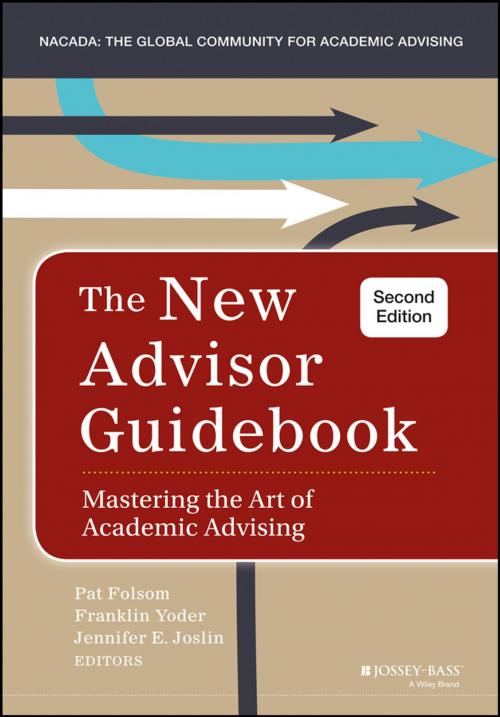The New Advisor Guidebook
Mastering the Art of Academic Advising
Nonfiction, Reference & Language, Education & Teaching, Higher Education| Author: | Pat Folsom, Franklin Yoder, Jennifer E. Joslin | ISBN: | 9781118823606 |
| Publisher: | Wiley | Publication: | August 21, 2015 |
| Imprint: | Jossey-Bass | Language: | English |
| Author: | Pat Folsom, Franklin Yoder, Jennifer E. Joslin |
| ISBN: | 9781118823606 |
| Publisher: | Wiley |
| Publication: | August 21, 2015 |
| Imprint: | Jossey-Bass |
| Language: | English |
This is an exciting time to be an academic advisor—a time in which global recognition of the importance of advising is growing, research affirms the critical role advising plays in student success, and institutions of higher education increasingly view advising as integral to their missions and essential for improving the quality of students' educational experiences. It is essential that advisors provide knowledgeable, realistic counsel to the students in their charge. The New Advisor Guidebook helps advisors meet this challenge.
The first and final chapters of the book identify the knowledge and skills advisors must master. These chapters present frameworks for setting and benchmarking self-development goals and for creating self-development plans. Each of the chapters in between focuses on foundational content: the basic terms, concepts, information, and skills advisors must learn in their first year and upon which they will build over the lengths of their careers. These chapters include strategies, questions, guidelines, examples, and case studies that give advisors the tools to apply this content in their work with students, from demonstrations of how student development theories might play out in advising sessions to questions advisors can ask to become aware of their biases and avoid making assumptions about students to a checklist for improving listening, interviewing, and referral skills. The book covers various ways in which advising is delivered: one-to-one, in groups, and online.
The New Advisor Guidebook serves as an introduction to what advisors must know to do their jobs effectively. It pairs with Academic Advising Approaches: Strategies That Teach Students to Make the Most of College, also from NACADA, which presents the delivery strategies successful advisors can use to help students make the most of their college experience.
This is an exciting time to be an academic advisor—a time in which global recognition of the importance of advising is growing, research affirms the critical role advising plays in student success, and institutions of higher education increasingly view advising as integral to their missions and essential for improving the quality of students' educational experiences. It is essential that advisors provide knowledgeable, realistic counsel to the students in their charge. The New Advisor Guidebook helps advisors meet this challenge.
The first and final chapters of the book identify the knowledge and skills advisors must master. These chapters present frameworks for setting and benchmarking self-development goals and for creating self-development plans. Each of the chapters in between focuses on foundational content: the basic terms, concepts, information, and skills advisors must learn in their first year and upon which they will build over the lengths of their careers. These chapters include strategies, questions, guidelines, examples, and case studies that give advisors the tools to apply this content in their work with students, from demonstrations of how student development theories might play out in advising sessions to questions advisors can ask to become aware of their biases and avoid making assumptions about students to a checklist for improving listening, interviewing, and referral skills. The book covers various ways in which advising is delivered: one-to-one, in groups, and online.
The New Advisor Guidebook serves as an introduction to what advisors must know to do their jobs effectively. It pairs with Academic Advising Approaches: Strategies That Teach Students to Make the Most of College, also from NACADA, which presents the delivery strategies successful advisors can use to help students make the most of their college experience.















